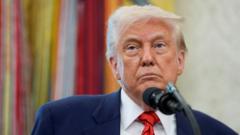The article discusses President Trump's emerging foreign policy in the Middle East and its implications for Israel as he forges relations with countries previously deemed adversarial.
**Trump's Middle East Diplomacy: Redefining Alliances Beyond Israel**

**Trump's Middle East Diplomacy: Redefining Alliances Beyond Israel**
In a bold diplomatic shift, President Trump's recent gestures toward Middle Eastern states signal a significant change in U.S. foreign policy, particularly regarding Israel.
President Trump's recent diplomatic maneuvers in the Middle East have stirred significant discussion by sidelining traditional ally Israel in favor of engaging with neighboring countries, including Syria. During a visit to Saudi Arabia, Trump met with Syria’s new leader, Ahmed al-Shara, who has historical ties to extremist groups, and announced the lifting of sanctions on his country aimed at fostering a path towards "greatness".
This move illustrates a pivotal shift in U.S. foreign policy, one that has involved warm gestures toward nations that Israel has actively opposed. Israel’s Prime Minister Benjamin Netanyahu expressed strong condemnation of al-Shara's regime, which Israel views as hostile.
Historically, U.S. presidents have treated Israel as a central player in Middle Eastern politics, providing unwavering support for its military and economic needs. However, with Trump’s latest actions, including the disregard for Netanyahu's warnings, the relationship dynamics are evidently changing.
Despite this trend, Trump claims that these relations will ultimately benefit Israel, asserting that stronger ties with a wider range of Middle Eastern countries will enhance security for Israel. This assertion, nevertheless, raises questions and concerns over Israel's traditional strategic position in regional affairs.
As he continues his tour, which includes further meetings with Gulf leaders, the extent of Trump’s plans to reshape U.S.-Israeli relations remains to be seen and could usher in a new era of diplomacy in the unstable region.
This move illustrates a pivotal shift in U.S. foreign policy, one that has involved warm gestures toward nations that Israel has actively opposed. Israel’s Prime Minister Benjamin Netanyahu expressed strong condemnation of al-Shara's regime, which Israel views as hostile.
Historically, U.S. presidents have treated Israel as a central player in Middle Eastern politics, providing unwavering support for its military and economic needs. However, with Trump’s latest actions, including the disregard for Netanyahu's warnings, the relationship dynamics are evidently changing.
Despite this trend, Trump claims that these relations will ultimately benefit Israel, asserting that stronger ties with a wider range of Middle Eastern countries will enhance security for Israel. This assertion, nevertheless, raises questions and concerns over Israel's traditional strategic position in regional affairs.
As he continues his tour, which includes further meetings with Gulf leaders, the extent of Trump’s plans to reshape U.S.-Israeli relations remains to be seen and could usher in a new era of diplomacy in the unstable region.





















